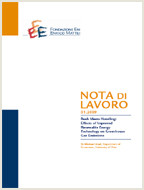Exogenous Oil Shocks, Fiscal Policy and Sector Reallocations in Oil Producing Countries

20.06.2011
Alessandro Cologni, Matteo Manera
C61, E22, E62, Q48
Oil Shocks, Dutch Disease, Resource Curse and Real Business Cycle Modelling
Energy: Resources and Markets
Giuseppe Sammarco
Previous literature has suggested that different mechanisms of transmission of exogenous oil shocks are responsible for the negative effects on the economic performances of oil exporting countries. This paper aims at providing further evidence on the role of sectoral reallocation between private and public sectors in explaining the impact of shocks to oil revenues on the economic growth rates of major oil producing countries (namely the GCC – Gulf Corporation Council – countries). The effects of oil shocks and expansionary fiscal policy on the business cycle of oil producing countries are examined. The possibility to distinguish between various components of public sector spending policy (that is, purchases of consumption goods, investments in productive activities and compensation for public employees) is, in particular, allowed for. A real business cycle (RBC) model is calibrated to fit the data on an “average” oil producing country. Results from the simulation of the theoretical model suggest that the possibility that crowding-out effects of public over private investments can explain a large fraction of the negative effects of shocks to oil revenues on the private sector of the economy. In addition, since the growth in size of the public sector is unable to compensate for the reduction in size of the private sector, an increase in oil revenues has the effect to decrease total output. An expansionary fiscal policy is argued to have significant positive effects on private investments, employment and overall production. On the contrary, a shock to government consumption expenditure impacts negatively the level of public investment. As employment in the public sector increases significantly, public output responds positively to a shock in government consumption expenditure. Finally, an instantaneous negative effect on total investments and on the stock of capital in the economy is predicted. However, driven by the increase of the number of employees in the economy, total output expands.
***
Suggested citation: Alessandro Cologni, Matteo Manera, Exogenous oil shocks, fiscal policies and sector reallocations in oil producing countries, Energy Economics, Volume 35, January 2013, Pages 42-57, ISSN 0140-9883, http://dx.doi.org/10.1016/j.eneco.2011.11.020.
